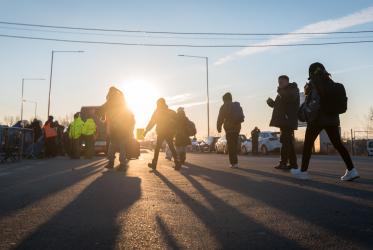WCC Executive Committee
14-17 February 2012
Bossey, Switzerland
1. During the past years thousands of asylum seekers from the Horn of Africa and Northern Africa have disappeared in the Sinai desert region while crossing the border between Egypt and Israel. The Sinai desert is a traditional transit route for people from Ethiopia, Eritrea, Somalia and Northern African countries escaping political turmoil, hunger and poverty and hoping to end up in Europe. The people of Eritrea have been facing deep political and human rights crises, due to which around 2,000 people are attempting to flee from Eritrea every month. They end up in the hands of human trafficking rackets or fall victim to organ theft. It is out of sheer desperation, in order to escape conflict, political turmoil and deteriorating human rights situations that people take such risky journeys. However, instead of safe passage to Israel, the refugees find themselves in desert detention centres in Sinai, where they are abused in the most dehumanizing manner.
2. A recent report revealed that some people have been held in purpose-built containers for more than a month by Bedouin people-traffickers in an area close to the Israeli border. Their captors, who are demanding payment from each person for release, are subjecting their captives to the most appalling abuse. They are bound by chains around their ankles, deprived of adequate food, given salty drinking water and are subjected to extreme methods of torture including electric shocks and whipping, in order to force payment by friends and families abroad, who are contacted by satellite telephone as the torture is occurring. Some are released and transferred across the border after payment has been made to the traffickers' representatives.
3. Physicians for Human Rights-Israel (PHR-I) recently reported that groups of refugees, mainly from Eritrea, are being held captive by smugglers at torture camps in the El-Arish area, captured while on the journey through the Sinai to Israel. The smugglers are demanding ransoms of thousands of dollars for the release of each captive, from relatives and friends who have reached Israel or are living in the diaspora. Methods used to apply pressure on the captives' relatives to pay include systematic violence and torture of the hostages. According to PHR-I, survivors report the use of violence including rape and sexual abuse. It was also reported that out of 30,000 people who have fled to Israel since 2009, mostly from countries like Tunisia, Libya, Ethiopia, Eritrea, Sudan and others, around 10,000 have died on the journey, and 3,000 have fallen prey to the brutal organ theft.
4. A recent report by Agenzia Habeshia, an organization monitoring the situation of refuges and asylum seekers, mentions that some 190 Eritrean and Ethiopian refugees are now being held captive in two torture camps in Sinai. The traffickers are demanding $10,000 - $30,000 ransom for many of these captives. Other asylum seekers are kept in jails by the Egyptian government, facing inhuman treatment and living under the menace of forced deportation, which implies a severe threat to their lives.
5. Human trafficking through the Sinai desert and inhuman treatment of refugees and asylum seekers are a matter of serious concern. The Commission of the Churches on International Affairs of the World Council of Churches organized a round table discussion in November last year at the Ecumenical Centre on the problem of asylum seekers who are stranded in the Sinai desert. The discussions during the round table meeting brought out stories on human trafficking and organ theft. The WCC has been challenged to initiate a process of more collaborative actions among churches and civil society organizations for advocacy in support of victims stranded in the Sinai desert.
6. The World Council of Churches has a long history and tradition of advocating for asylum seekers, refugees and all other uprooted people. Our Christian values and principles challenge us to provide care and attention for the vulnerable. As one of the undeniable values of the Christian faith, it calls us to express and provide loving care to those exposed to threats and uncertainty; and to be the voice of the voiceless and speak out for their rights and dignity.
The executive committee of the World Council of Churches, meeting at Bossey, Switzerland, 14-17 February 2012, therefore,
A. Calls on its member churches, related ecumenical organizations and agencies to raise awareness of the situation of asylum seekers, especially regarding the problem of human trafficking and organ theft;
A. Appeals to the WCC member churches, especially the churches in the neighbouring regions, to be engaged in advocacy concerning the inhuman treatment of refugees kept in jails;
B. Calls on the Egyptian government to prosecute the traffickers and close down their detention sites;
C. Encourages the Israeli authorities to intensify their efforts in order to apprehend suspects within the state who are cooperating with human traffickers in Sinai who abuse and hold African asylum seekers for ransom;
D. Appeals to donors to support the UNHCR in its joint project with the International Organization for Migration (IOM) to research the trafficking and kidnapping issue, improve security in the refugee camps and develop local authorities' ability to deal with the problem.



